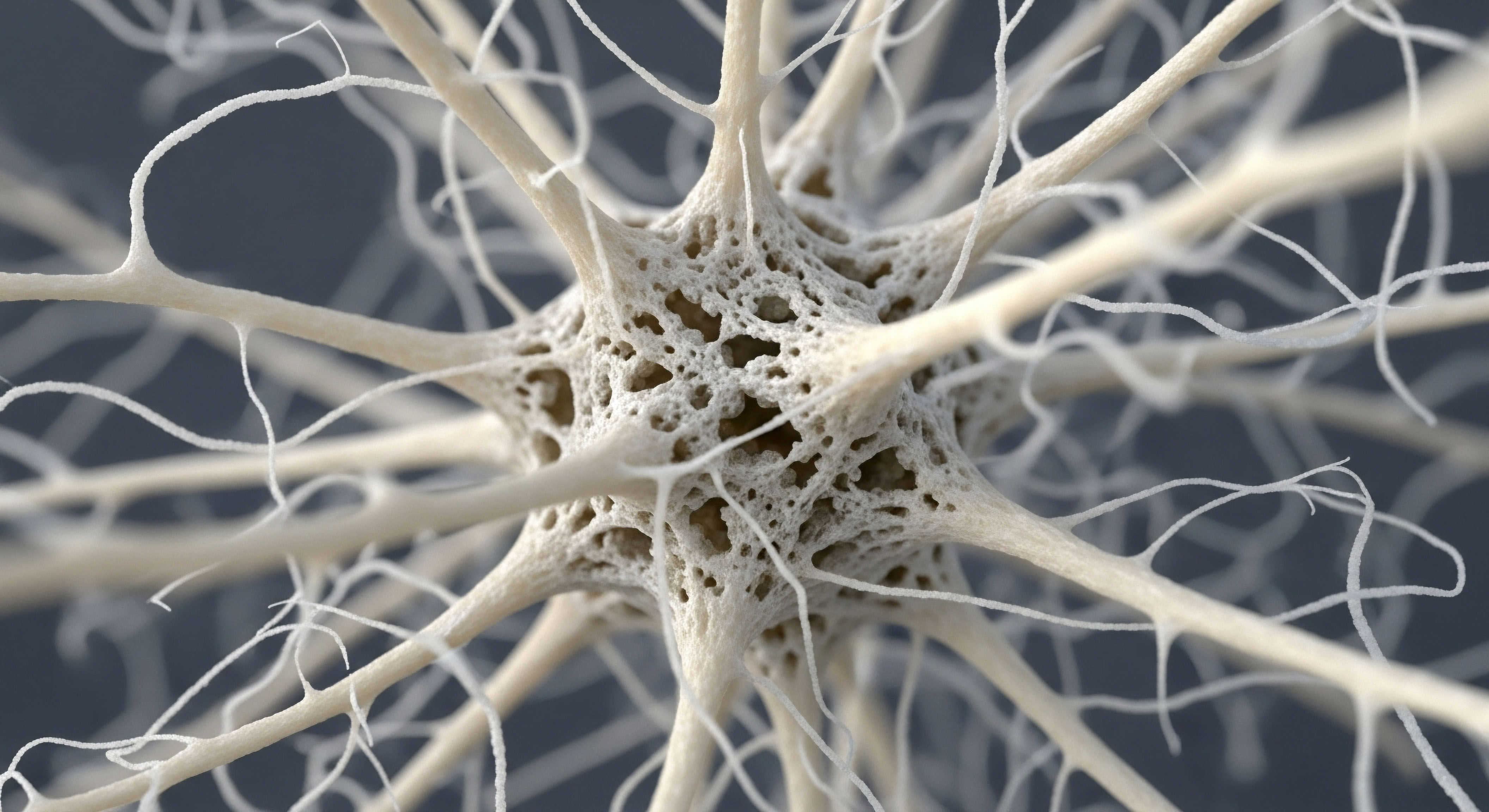

Fundamentals
When you experience a persistent feeling of fatigue, a subtle decline in your physical capacity, or a general sense that your body is not operating with its usual vigor, it is natural to seek explanations. These sensations often prompt a deep personal inquiry into what might be amiss within your biological systems.
Many individuals describe a gradual erosion of their vitality, a quiet shift from robust health to a state where daily activities feel more demanding. This experience is not merely a sign of aging; it frequently signals an underlying imbalance within the body’s intricate communication networks, particularly those governed by hormones and metabolic processes. Understanding these internal signals is the initial step toward reclaiming your optimal well-being.
Your body operates through a sophisticated symphony of chemical messengers, and among the most vital are peptides. These short chains of amino acids act as biological signals, directing a vast array of cellular activities. They are distinct from larger proteins and play a critical role in regulating everything from cellular repair to metabolic rate.
Consider them as highly specific keys designed to fit particular locks on cell surfaces, initiating precise responses. When these keys are present in appropriate amounts and configurations, your body functions with remarkable efficiency. When their levels are suboptimal, or their signaling pathways are disrupted, the effects can ripple throughout your entire system, influencing your energy levels, cognitive clarity, and even the health of your most vital organs.
The heart, a tireless organ, relies on a delicate balance of hormonal and metabolic signals to maintain its rhythmic contractions and efficient blood circulation. Myocardial health, referring to the condition of your heart muscle, is not isolated from the rest of your physiology. It is deeply intertwined with your overall endocrine system and metabolic function.
For instance, imbalances in thyroid hormones can directly impact heart rate and contractility, while suboptimal insulin sensitivity can contribute to systemic inflammation that burdens cardiac tissue. The heart’s ability to adapt to stress, repair itself, and maintain its structural integrity is profoundly influenced by the availability and activity of various signaling molecules, including specific peptides.
Peptides serve as essential biological messengers, orchestrating cellular functions and maintaining systemic balance, including the health of the heart.

Understanding Hormonal Balance and Cardiac Function
The endocrine system, a network of glands that produce and release hormones, exerts pervasive control over virtually every bodily process. Hormones are chemical substances that act as the body’s internal messaging service, traveling through the bloodstream to distant organs and tissues, where they regulate growth, metabolism, reproduction, and mood.
When discussing myocardial health, it is impossible to separate it from the broader context of hormonal equilibrium. For example, adequate levels of testosterone and estrogen are not solely important for reproductive health; they also play significant roles in maintaining cardiovascular integrity, influencing vascular tone, lipid metabolism, and myocardial contractility.
A decline in these vital hormonal messengers, often associated with aging or specific health conditions, can lead to a cascade of effects that impact the heart. For men, a reduction in testosterone, commonly referred to as andropause or low T, can manifest as reduced energy, decreased muscle mass, and a diminished sense of well-being.
From a cardiac perspective, lower testosterone levels have been correlated with changes in body composition, including increased visceral fat, which contributes to metabolic stress on the heart. Similarly, women experiencing perimenopause or post-menopause often report symptoms such as hot flashes, sleep disturbances, and mood fluctuations, which are direct consequences of fluctuating or declining estrogen and progesterone levels. These hormonal shifts can also influence cardiovascular risk factors, affecting blood pressure regulation and arterial elasticity.
The heart’s energetic demands are substantial, requiring a constant supply of fuel and efficient metabolic pathways. Metabolic function refers to the biochemical processes that convert food into energy and building blocks for the body. When metabolic pathways become inefficient, such as in cases of insulin resistance, the heart muscle may struggle to obtain and utilize energy effectively.
This can lead to cellular stress and, over time, contribute to a decline in cardiac performance. Peptide therapies offer a unique avenue to support both hormonal balance and metabolic efficiency, thereby indirectly and directly influencing myocardial health. They can act as targeted signals, helping to restore cellular communication and optimize the body’s inherent capacity for repair and regeneration.

What Are Peptides and How Do They Work?
Peptides are naturally occurring biological molecules. They are essentially miniature proteins, composed of short chains of amino acids linked by peptide bonds. Their size, typically ranging from 2 to 50 amino acids, distinguishes them from larger proteins. This smaller size allows them to be highly specific in their actions, often binding to particular receptors on cell surfaces to initiate a precise biological response. The human body produces thousands of different peptides, each with a unique role in regulating physiological processes.
The mechanism of action for peptides is akin to a lock-and-key system. Each peptide possesses a unique three-dimensional structure that allows it to bind specifically to a corresponding receptor on a target cell. This binding event triggers a cascade of intracellular signaling pathways, leading to a specific cellular outcome.
For instance, some peptides might stimulate the release of other hormones, while others might promote cellular growth, reduce inflammation, or enhance metabolic activity. Their specificity minimizes off-target effects, making them a compelling therapeutic option for precise biological modulation.
The therapeutic application of peptides involves introducing exogenous peptides that mimic or enhance the action of naturally occurring ones. This approach aims to restore or optimize physiological functions that may have become compromised due to aging, disease, or stress. For example, certain peptides can stimulate the body’s own production of growth hormone, while others can directly influence tissue repair or immune function. The goal is to recalibrate the body’s internal systems, allowing them to operate with greater efficiency and resilience.


Intermediate
Moving beyond the foundational understanding of peptides, we can now consider how specific peptide therapies are strategically employed to influence myocardial health and function. The heart, a muscular pump, is constantly working, and its long-term health depends on its ability to maintain cellular integrity, manage metabolic demands, and respond effectively to physiological stress.
Peptide therapies offer targeted interventions that can support these vital cardiac processes, often by modulating systemic hormonal environments or directly influencing cellular repair mechanisms within the myocardium.
One significant area of application involves peptides that influence the growth hormone axis. Growth hormone (GH) plays a crucial role in tissue repair, cellular regeneration, and metabolic regulation throughout the body, including the heart. As individuals age, natural GH production often declines, which can contribute to changes in body composition, reduced vitality, and potentially impact cardiovascular health.
Peptides such as Sermorelin, Ipamorelin, and CJC-1295 are classified as Growth Hormone-Releasing Peptides (GHRPs) or Growth Hormone-Releasing Hormone (GHRH) analogs. They work by stimulating the pituitary gland to produce and release more of the body’s own growth hormone.
The benefits of optimizing growth hormone levels, particularly through the body’s natural production, extend to myocardial health. Enhanced GH levels can support cardiac muscle integrity, improve metabolic efficiency within heart cells, and contribute to a more favorable body composition by reducing visceral fat, which lessens the burden on the cardiovascular system. This indirect support for the heart through systemic metabolic improvement is a key aspect of these therapies.
Peptide therapies, particularly those influencing growth hormone, can support myocardial health by enhancing cellular repair and metabolic efficiency.

Growth Hormone Peptide Protocols and Myocardial Support
Protocols for growth hormone peptide therapy are tailored to individual needs and goals, often targeting anti-aging effects, muscle gain, fat loss, and sleep improvement. For active adults and athletes, these peptides can contribute to enhanced recovery and tissue repair, which indirectly benefits the cardiovascular system by supporting overall physiological resilience.
Commonly utilized growth hormone-releasing peptides include:
- Sermorelin ∞ A synthetic analog of GHRH, it stimulates the pituitary gland to release growth hormone in a pulsatile, physiological manner. This mimics the body’s natural rhythm, minimizing potential side effects.
- Ipamorelin / CJC-1295 ∞ Ipamorelin is a selective GHRP that promotes GH release without significantly increasing cortisol or prolactin, which can be beneficial.
CJC-1295 is a GHRH analog with a longer half-life, allowing for less frequent dosing. When combined, Ipamorelin and CJC-1295 offer a synergistic effect, providing sustained and robust GH release.
- Tesamorelin ∞ A GHRH analog specifically approved for reducing excess abdominal fat in individuals with HIV-associated lipodystrophy, it has shown promise in improving body composition, which can alleviate metabolic stress on the heart.
- Hexarelin ∞ A potent GHRP, Hexarelin has demonstrated cardioprotective effects in some studies, potentially by influencing cardiac remodeling and function, though its primary use remains GH release.
- MK-677 (Ibutamoren) ∞ While not a peptide, MK-677 is a non-peptide growth hormone secretagogue that orally stimulates GH release. It works by mimicking the action of ghrelin, a natural hormone that stimulates GH secretion.
The influence of these peptides on myocardial health is often multifaceted. By promoting optimal growth hormone levels, they can contribute to:
- Improved Cardiac Metabolism ∞ Enhanced GH can support the heart’s ability to utilize fatty acids and glucose more efficiently for energy production, which is vital for sustained cardiac function.
- Myocardial Remodeling ∞ In certain contexts, GH has been implicated in beneficial cardiac remodeling, helping to maintain the heart’s structural integrity and function, particularly in conditions involving cardiac stress.
- Reduced Systemic Inflammation ∞ By improving body composition and metabolic health, these peptides can indirectly reduce systemic inflammation, a known contributor to cardiovascular disease progression.
- Enhanced Recovery ∞ For individuals undergoing physical stress or recovery from injury, optimized GH levels can accelerate tissue repair, including potentially micro-damage within cardiac tissue, supporting overall resilience.

Targeted Peptides for Direct Cardiac and Systemic Support
Beyond growth hormone secretagogues, other specific peptides offer more direct or complementary benefits to myocardial health and overall well-being. These peptides address various physiological pathways that indirectly or directly impact cardiovascular function.
Pentadeca Arginate (PDA), also known as BPC-157, is a synthetic peptide derived from a gastric protective protein. It has garnered significant attention for its remarkable regenerative and anti-inflammatory properties. PDA is recognized for its ability to accelerate tissue repair across various organ systems, including muscles, tendons, ligaments, and the gastrointestinal tract. Its systemic healing capabilities are particularly relevant to myocardial health.
PDA’s influence on the heart stems from its capacity to promote angiogenesis, the formation of new blood vessels, which can improve blood flow to damaged or compromised tissues. It also exhibits potent anti-inflammatory effects, which are crucial for mitigating the chronic inflammation that often underlies cardiovascular dysfunction.
By supporting the integrity of the vascular system and reducing inflammatory burdens, PDA contributes to a healthier environment for myocardial cells. Its role in tissue repair means it could potentially aid in the recovery of cardiac tissue following stress or injury, although more targeted research in this specific area is ongoing.
While PT-141 (Bremelanotide) is primarily known for its application in sexual health, particularly for addressing sexual dysfunction in both men and women, its mechanism of action through the melanocortin system has broader implications for systemic well-being. PT-141 acts on melanocortin receptors in the brain, influencing pathways related to sexual arousal.
While not directly targeting myocardial tissue, improved sexual health and the associated reduction in psychological stress can contribute to overall quality of life, which indirectly supports cardiovascular health. Chronic stress and anxiety are known risk factors for cardiovascular issues, and addressing such concerns can have a positive ripple effect on the heart.
The comprehensive approach to wellness often involves addressing multiple interconnected systems. Hormonal optimization protocols, such as Testosterone Replacement Therapy (TRT) for men and women, are foundational in this regard. When testosterone levels are optimized, particularly in men experiencing low T or andropause, improvements in body composition, energy levels, and mood are frequently observed.
These systemic improvements lessen the metabolic load on the heart. For men, a standard protocol might involve weekly intramuscular injections of Testosterone Cypionate (200mg/ml), often combined with Gonadorelin to maintain natural testosterone production and fertility, and Anastrozole to manage estrogen conversion.
For women, hormonal balance is equally vital for cardiovascular health. Protocols for women, including those in pre-menopausal, peri-menopausal, and post-menopausal stages, may involve subcutaneous injections of Testosterone Cypionate (10 ∞ 20 units weekly) and Progesterone, with pellet therapy as an alternative for long-acting testosterone delivery.
These interventions aim to alleviate symptoms like irregular cycles, mood changes, and hot flashes, while also supporting bone density and cardiovascular integrity. The restoration of hormonal equilibrium through these targeted therapies creates a more stable internal environment, allowing the heart to function optimally.
The synergy between peptide therapies and hormonal optimization protocols is a significant consideration. Peptides can enhance the body’s response to hormonal recalibration, or address specific cellular needs that hormones alone might not fully resolve. This integrated approach reflects a deep understanding of the body as an interconnected system, where optimizing one pathway can create beneficial effects across multiple physiological domains, ultimately supporting myocardial health and overall vitality.
| Peptide | Primary Mechanism | Potential Cardiac Relevance |
|---|---|---|
| Sermorelin | Stimulates pituitary GH release (GHRH analog) | Indirect ∞ Improves metabolism, body composition, reduces cardiac load. |
| Ipamorelin / CJC-1295 | Stimulates pituitary GH release (GHRP/GHRH analog) | Indirect ∞ Supports tissue repair, metabolic efficiency, systemic health. |
| Tesamorelin | GHRH analog, reduces visceral fat | Indirect ∞ Alleviates metabolic stress on the heart by reducing fat. |
| Hexarelin | Potent GHRP | Direct/Indirect ∞ Potential cardioprotective effects, influences cardiac remodeling. |
| MK-677 (Ibutamoren) | Non-peptide GH secretagogue | Indirect ∞ Supports muscle mass, bone density, metabolism, reducing cardiac burden. |


Academic
The influence of specific peptide therapies on myocardial health and function extends into the complex realms of cellular signaling, metabolic regulation, and the intricate interplay of biological axes. To truly comprehend how these short amino acid chains exert their effects on the heart, one must consider their molecular mechanisms and their systemic ramifications.
The heart, as a highly metabolic organ, is particularly sensitive to changes in energy substrate availability, mitochondrial function, and the balance of pro-inflammatory and anti-inflammatory mediators. Peptide therapies, by modulating these fundamental processes, offer a sophisticated means of supporting cardiac resilience and function.
A central theme in understanding peptide influence on myocardial health revolves around the Hypothalamic-Pituitary-Gonadal (HPG) axis and its profound connection to cardiovascular physiology. While peptides like Sermorelin or Ipamorelin directly stimulate the pituitary for growth hormone release, other peptides and hormonal optimization protocols indirectly support cardiac function by recalibrating the HPG axis.
For instance, in men, declining testosterone levels are associated with adverse cardiovascular risk factors, including dyslipidemia, insulin resistance, and increased visceral adiposity. Testosterone, acting through androgen receptors in cardiomyocytes and vascular endothelial cells, influences myocardial contractility, vascular tone, and endothelial function.
When testosterone levels are optimized through targeted interventions such as Testosterone Replacement Therapy (TRT), the systemic metabolic environment improves. This can lead to a reduction in systemic inflammation and oxidative stress, both of which are detrimental to myocardial health.
The use of Gonadorelin in TRT protocols for men, for example, aims to maintain the pulsatile release of GnRH from the hypothalamus, thereby preserving testicular function and endogenous testosterone production. This approach supports the HPG axis’s integrity, which in turn contributes to a more stable hormonal milieu conducive to cardiovascular well-being.
Optimizing the HPG axis through hormonal therapies can indirectly support myocardial health by improving systemic metabolic and inflammatory profiles.

Peptide Modulators of Cardiac Cellular Processes
Beyond the systemic effects of growth hormone secretagogues and HPG axis modulation, certain peptides exhibit more direct effects on cardiac cellular processes. The peptide Pentadeca Arginate (PDA), also known as BPC-157, exemplifies this direct influence. Derived from human gastric juice, PDA has demonstrated remarkable regenerative capabilities. Its mechanism of action involves several pathways critical for tissue repair and protection. PDA has been shown to stabilize the gastric mucosal barrier, promote angiogenesis, and exert potent anti-inflammatory and antioxidant effects.
In the context of myocardial health, PDA’s ability to promote angiogenesis is particularly significant. Adequate blood supply is paramount for cardiac function, and the formation of new blood vessels can improve oxygen and nutrient delivery to myocardial cells, especially in conditions of ischemia or injury.
Furthermore, PDA’s anti-inflammatory properties can mitigate the damaging effects of chronic inflammation on cardiac tissue. Inflammation is a key driver in the progression of various cardiovascular diseases, including atherosclerosis and myocardial fibrosis. By reducing inflammatory mediators and promoting tissue healing, PDA offers a promising avenue for supporting cardiac recovery and resilience. Its influence on the nitric oxide (NO) system, a crucial regulator of vascular tone and blood flow, also contributes to its potential cardiovascular benefits.
Another peptide with direct relevance to cellular health is Hexarelin. While primarily a growth hormone-releasing peptide, Hexarelin also possesses independent cardioprotective properties, acting through mechanisms distinct from its GH-releasing activity. Research indicates that Hexarelin can bind to CD36 receptors on cardiomyocytes, influencing cellular survival pathways and potentially mitigating myocardial damage following ischemic events.
It has been observed to reduce infarct size and improve cardiac function in experimental models of myocardial ischemia-reperfusion injury. This suggests a direct protective effect on the heart muscle cells themselves, independent of its systemic metabolic actions.

How Do Peptide Therapies Influence Myocardial Metabolism?
The heart is an organ with exceptionally high metabolic demands, relying primarily on fatty acid oxidation for energy production. Any disruption in metabolic pathways can severely compromise cardiac function. Peptide therapies, particularly those that influence growth hormone, can significantly impact myocardial metabolism. Growth hormone, whether endogenously stimulated by peptides like Sermorelin or Ipamorelin, or exogenously administered, plays a role in regulating substrate utilization in the heart.
Optimized growth hormone levels can enhance the efficiency of mitochondrial function within cardiomyocytes. Mitochondria are the cellular powerhouses responsible for generating ATP, the energy currency of the cell. Improved mitochondrial biogenesis and function lead to more efficient energy production, which is vital for the heart’s continuous contractile activity.
Furthermore, growth hormone influences lipid metabolism, potentially reducing circulating triglycerides and improving insulin sensitivity, which in turn lessens the metabolic burden on the heart. A reduction in visceral fat, often observed with GH optimization, directly translates to decreased systemic inflammation and improved metabolic profiles, benefiting the cardiovascular system.
The interplay between peptides and metabolic health extends to glucose regulation. Peptides that improve insulin sensitivity, even indirectly, contribute to better glucose uptake and utilization by cardiac cells. Dysregulated glucose metabolism, as seen in insulin resistance and type 2 diabetes, can lead to glucotoxicity and lipotoxicity in the myocardium, contributing to cardiac dysfunction. By supporting a more balanced metabolic state, peptide therapies help maintain the heart’s energetic equilibrium, allowing it to function optimally under various physiological conditions.
| Peptide Type/Protocol | Primary Mechanism of Action | Direct Myocardial Impact | Indirect Myocardial Impact |
|---|---|---|---|
| GH-Releasing Peptides (Sermorelin, Ipamorelin, CJC-1295) | Stimulate endogenous Growth Hormone release | Potential for beneficial cardiac remodeling, improved mitochondrial function. | Improved body composition, reduced metabolic stress, enhanced systemic repair. |
| Pentadeca Arginate (PDA/BPC-157) | Angiogenesis, anti-inflammatory, tissue repair | Promotes blood vessel formation, reduces cardiac inflammation, supports tissue healing. | Systemic healing, reduced oxidative stress, improved vascular integrity. |
| Hexarelin | GHRP, direct cardioprotective effects | Reduces infarct size, improves cardiac function post-ischemia, influences cellular survival. | Systemic GH effects (metabolism, body composition). |
| Testosterone Replacement Therapy (TRT) | Optimizes testosterone levels | Direct effects on myocardial contractility, vascular tone. | Improved body composition, lipid profile, insulin sensitivity, reduced inflammation. |

How Do Hormonal Optimization Protocols Support Cardiac Resilience?
The connection between hormonal balance and myocardial resilience is profound. Hormones act as master regulators, influencing cellular growth, repair, and metabolic efficiency. When these hormonal systems are in equilibrium, the heart is better equipped to withstand physiological stressors and maintain its long-term function.
Consider the role of testosterone in both male and female physiology. In men, adequate testosterone levels are associated with healthier lipid profiles, improved insulin sensitivity, and reduced risk of metabolic syndrome, all of which are protective for the cardiovascular system. Testosterone directly influences the expression of genes involved in cardiac muscle function and vascular health.
For women, appropriate testosterone levels contribute to muscle mass, bone density, and libido, and also play a role in cardiovascular health by influencing endothelial function and arterial stiffness. The precise dosing in female TRT protocols, such as 10 ∞ 20 units (0.1 ∞ 0.2ml) weekly via subcutaneous injection of Testosterone Cypionate, is designed to achieve therapeutic benefits without supraphysiological levels.
The use of Anastrozole in TRT protocols, particularly for men, is a strategic intervention to manage estrogen conversion. While estrogen is beneficial in appropriate amounts, excessive conversion from testosterone can lead to undesirable side effects and potentially impact cardiovascular markers. By modulating estrogen levels, Anastrozole helps maintain a balanced hormonal environment that supports overall health, including cardiac function.
Similarly, Progesterone, often prescribed for women based on menopausal status, is vital for uterine health and bone density, and also plays a role in cardiovascular protection by influencing vascular reactivity.
The concept of Post-TRT or Fertility-Stimulating Protocols for men highlights the sophisticated understanding of hormonal feedback loops. When men discontinue TRT, the HPG axis needs support to resume endogenous testosterone production. Protocols involving Gonadorelin, Tamoxifen, and Clomid are designed to stimulate the pituitary and testes, restoring natural hormonal rhythms.
This careful recalibration ensures that the body’s intrinsic systems for hormonal regulation are reactivated, which is crucial for long-term physiological stability and, by extension, sustained myocardial health. This comprehensive approach underscores the commitment to not just treating symptoms, but restoring the body’s innate capacity for balance and vitality.

References
- Jones, T. H. & Saad, F. (2019). The Role of Testosterone in Cardiovascular Health. Journal of Clinical Endocrinology & Metabolism, 104(5), 1537-1549.
- Nieschlag, E. & Nieschlag, S. (2018). Testosterone ∞ Action, Deficiency, Substitution. Cambridge University Press.
- Sikiric, P. et al. (2019). BPC 157, a novel peptide, in clinical practice. Journal of Physiology and Pharmacology, 70(2), 205-219.
- Seiwerth, S. et al. (2018). BPC 157 and the central nervous system. Current Medicinal Chemistry, 25(16), 1887-1899.
- Gao, J. et al. (2014). Hexarelin protects against myocardial ischemia/reperfusion injury by inhibiting oxidative stress and inflammation. Peptides, 59, 1-8.
- Traish, A. M. et al. (2011). The dark side of testosterone deficiency ∞ II. Type 2 diabetes and insulin resistance. Journal of Andrology, 32(5), 478-494.
- Veldhuis, J. D. et al. (2006). Growth hormone-releasing hormone (GHRH) and GHRH analogs ∞ Mechanisms of action and clinical utility. Growth Hormone & IGF Research, 16(Suppl A), S1-S11.
- Giustina, A. et al. (2019). Growth Hormone and Cardiovascular Disease. Endocrine Reviews, 40(2), 565-592.

Reflection
Having explored the intricate ways specific peptide therapies and hormonal optimization protocols influence myocardial health, you might find yourself contemplating your own biological systems with a renewed sense of curiosity. This journey into the science of vitality is not merely an academic exercise; it is an invitation to consider your personal health narrative. The information presented here serves as a framework, a lens through which to view the subtle shifts and profound connections within your own body.
Understanding these mechanisms is a powerful first step. It empowers you to engage in more informed conversations about your well-being, to ask deeper questions, and to seek personalized guidance that aligns with your unique physiological blueprint. Your path to reclaiming optimal function and sustained vitality is a deeply personal one, requiring a tailored approach that respects your individual needs and aspirations.



